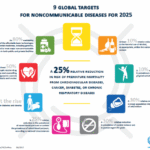A growing body of research and anecdotal evidence is highlighting a concerning trend: a significant increase in mental health challenges among young adults globally. Experts are pointing to a complex interplay of social, economic, and technological factors contributing to this rise, including increased social isolation, academic and career pressures, and the pervasive influence of social media. The trend is prompting calls for greater awareness, improved access to mental health services, and a re-evaluation of societal factors impacting the well-being of this demographic.
Studies across various countries have reported a surge in anxiety, depression, and other mental health conditions among individuals in their late teens and twenties. This increase predates the COVID-19 pandemic but has been exacerbated by the disruptions and uncertainties of recent years. Lockdowns, social distancing measures, and economic anxieties have disproportionately affected young adults, disrupting their education, social lives, and early career development.
The digital age and the rise of social media are also believed to play a significant role. While offering avenues for connection, social media can also contribute to feelings of inadequacy, social comparison, and cyberbullying. The constant exposure to curated online personas and the pressure to maintain a perfect online image can negatively impact self-esteem and mental well-being. Furthermore, excessive screen time has been linked to sleep disturbances and increased feelings of isolation.
Academic and career pressures are another significant factor. Young adults often face intense competition for university admissions and entry-level jobs. The pressure to succeed academically and professionally, coupled with economic uncertainties and the burden of student loan debt in some regions, can contribute to significant stress and anxiety. The transition to adulthood, with its associated responsibilities and expectations, can also be a challenging period for mental health.
The consequences of this rise in mental health issues among young adults are far-reaching. Beyond the individual suffering, it can impact educational attainment, workforce productivity, and social relationships. Untreated mental health conditions can also increase the risk of substance abuse and suicide.
Addressing this growing crisis requires a multi-pronged approach. Increased awareness campaigns aimed at destigmatizing mental health and encouraging help-seeking behavior are crucial. Expanding access to affordable and youth-friendly mental health services, both online and in person, is also essential. This includes investing in training more mental health professionals and integrating mental health support into educational institutions and workplaces.
Furthermore, addressing the societal factors contributing to poor mental health among young adults is vital. This includes fostering stronger social connections, promoting healthy online habits, and creating more supportive academic and work environments. Encouraging open conversations about mental health and building resilience skills among young people can also play a significant role in prevention and early intervention.
The rising rates of mental health issues among young adults represent a significant public health challenge. By understanding the contributing factors and implementing comprehensive strategies that address both individual needs and broader societal influences, we can work towards improving the mental well-being of this vulnerable population and ensuring a healthier future for all.















